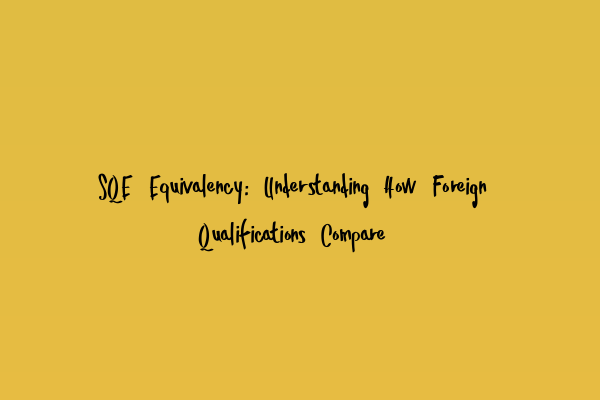SQE Equivalency: Understanding How Foreign Qualifications Compare
In today’s globalized world, legal professionals are increasingly seeking opportunities to work across borders. As the legal landscape becomes more interconnected, it is essential to understand how foreign qualifications stand against the Solicitors Qualifying Exam (SQE) in the United Kingdom. This blog post aims to shed light on the SQE equivalency and help aspiring solicitors navigate the process.
How does the SQE work?
The Solicitors Qualifying Exam is the new assessment framework for individuals wishing to qualify as solicitors in England and Wales. It replaces the Qualified Lawyers Transfer Scheme (QLTS) and offers a more streamlined approach to qualification.
The SQE is divided into two stages: SQE1 and SQE2. SQE1 assesses candidates’ functioning legal knowledge through multiple-choice questions and written tasks. On the other hand, SQE2 examines candidates’ practical legal skills, such as legal research, writing, drafting, advocacy, and client interviewing.
SQE Equivalency for Foreign Qualifications
Individuals who have completed their legal education and qualifications outside of the United Kingdom may wonder how their credentials compare to the SQE. Understanding the equivalency of foreign qualifications is crucial for those seeking to work as solicitors in England and Wales.
The Solicitors Regulation Authority (SRA), which regulates solicitors in the UK, has outlined the equivalency process for foreign qualifications. The SRA evaluates foreign qualifications based on various factors, including the content of the study, the duration of the program, and the method of assessment.
The SRA employs a comprehensive methodology to ensure that foreign qualifications meet the necessary standards for admission to the profession. This process involves an assessment of the content and outcomes of the qualification, as well as an evaluation of the institution where the qualification was obtained. Foreign qualifications may require additional assessments or training to bridge any gaps in knowledge or skills.
Factors Affecting Equivalency
When assessing the equivalency of foreign qualifications, various factors come into play. Some of the key factors include:
1. Curriculum: The SRA assesses whether the foreign qualification covers equivalent legal subjects as required by the SQE. This evaluation ensures that candidates possess a foundational understanding of key legal areas.
2. Duration of the Program: The SRA considers the length of the program in determining equivalency. The intention is to ensure that candidates have undergone a sufficient period of study to acquire the necessary legal knowledge and skills.
3. Assessment Methods: The SRA examines the assessment methods employed by the foreign qualification’s institution. This evaluation ensures that candidates have undergone rigorous testing and evaluation processes that mirror the standards set by the SQE.
Bridge the Gap with Additional Training
In some cases, candidates with foreign qualifications may be required to undergo additional training to bridge any gaps identified during the equivalency assessment. The purpose of this additional training is to ensure that candidates are adequately prepared to meet the standards expected of solicitors in England and Wales. The specific training requirements will depend on the areas of deficiency identified in the equivalency assessment.
Seeking Guidance and Support
Navigating the equivalency process for foreign qualifications can be complex and overwhelming. It is crucial to seek guidance and support from experts who specialize in SQE equivalency. Professional solicitor training providers can offer invaluable assistance by providing personalized advice, training programs, and expert knowledge on the requirements and expectations of the SRA.
Conclusion
As globalization continues to reshape the legal profession, understanding how foreign qualifications compare to the SQE is essential for legal professionals aiming to work in England and Wales. The SQE equivalency process, although rigorous, ensures that candidates possess the necessary legal knowledge and skills required to excel in their legal careers. By seeking guidance and support from expert solicitor training providers, individuals with foreign qualifications can successfully navigate the equivalency process and pursue their dream of becoming qualified solicitors in the UK.

Leave a Reply